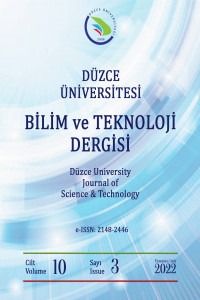Öz
In this study, firstly, we analyzed power Fibonacci sequences defined by Ide and Renault in [13]. Then, we described two power Horadam sequences modulo s for u=1,v=3 and u=3,v=1, respectively. We determined those modulus s for which the two power Horadam sequences exist and the number of such sequences for a given s. We formulated the periods of these power Horadam sequences in terms of the periods of Horadam sequences for u=1,v=3 and u=3,v=1. Finally, we compared that the period formulas of power Horadam sequences which we obtained and the period formulas of power Fibonacci sequences. We found that, the periods formulas of the power Horadam sequences for u=3,v=1 are the same as the period formulas of the power Fibonacci sequences; but for u=1,v=3, a certain relationship couldn’t be established between the periods of these power sequences.
Anahtar Kelimeler
Kaynakça
- [1] T. Koshy, Fibonacci and Lucas Numbers with Applications. New York, John Wiley&Sons, 2019.
- [2] A.F. Horadam, “Basic properties of a certain generalized sequence of numbers,” The Fibonacci Quarterly, vol. 3, no. 3, pp. 161-176, 1965.
- [3] M. Edson, O.Yayenie, “A new generalization of Fibonacci sequence extended Binet’s formula,” Integers, vol. 9, no. 6, pp. 639, 2009.
- [4] S. Falcon, A. Plaza, “On the Fibonacci k-numbers,” Chaos, Solitons & Fractals, vol. 32, no. 5, pp. 1615-1624, 2007.
- [5] G.Y. Lee, “Fibonacci k-Lucas numbers and associated bipartite graphs,” Lineer Algebra and its Applications, vol. 320, pp. 51-61, 2000.
- [6] D. Andrica, O. Bagdasar, Recurrent Sequences: Key Results, Applications, and Problems. Springer Nature, 2020.
- [7] N.J.A. Sloane, A Handbook of Integer Sequences. New York, Academic Press, Inc, 1973.
- [8] D. Taşçi, E. Kilic, “On the order k-generalized Lucas numbers,” Applied Mathematics and Computation, vol. 155, no.3, pp. 637-641, 2004.
- [9] N. Taşkara, K. Uslu, H.H. Güleç, “On the properties of Lucas numbers with binomial coefficients,” Applied Mathematics Letters, vol. 23, no.1, pp. 68-72, 2010. [10] K. Uslu., N. Taskara, H. Kose, “The generalized k-Fibonacci and k-Lucas number,”.Ars Combinatoria, vol. 99, pp. 25-32, 2011.
- [11] S. Vajda, Fibonacci and Lucas Numbers and the Golden Section. Chichester: Ellis Horwood, 1989.
- [12] Y. Yazlik, N. Taşkara, “A note on generalized k-Horadam sequence,” Computers & Mathematics with Applications, vol. 63, no 1, pp. 36-41, 2012.
- [13] J. Ide, M.S. Renault, “Power Fibonacci sequences,” The Fibonacci Quarterly, vol. 50, no. 2 pp. 175-180, 2012.
- [14] D.D. Wall, “Fibonacci series modulo m,” The American Mathematical Monthly, vol. 67, no. 6, pp. 525-532, 1960.
- [15] M. Renault, “The Fibonacci sequence under various moduli,” Wake Forest University, Institute of Science, Master's Thesis, 82p, Winston-Salem. 1996.
- [16] C. Guo, A. Koch, “Bounds for Fibonacci period growth,” Involve A Journal of Mathematics, vol. 2, no. 2, pp. 195-210, 2009.
- [17] I. Niven, H. Zuckerman, H. Montgomery, An Introduction to the Theory of Numbers. John Wiley & Sons, Inc., 1991.
Öz
Bu çalışmada, ilk olarak, kaynak [13]de Ide ve Renault tarafından tanımlanan Fibonacci kuvvet dizilerini inceledik. Sonrasında, sırasıyla u=1,v=3 ve u=3,v=1 için modül s de iki tane Horadam kuvvet dizisi tanımladık. Bu iki kuvvet dizisinin var olduğu s modüllerini ve verilen bir s modülü için bu dizilerin sayısını belirledik. u=1,v=3 ve u=3,v=1 durumları için tanımladığımız bu Horadam kuvvet dizilerinin periyotlarını, Horadam dizilerinin periyotları cinsinden formülize ettik. Son olarak, Horadam kuvvet dizilerinin elde ettiğimiz periyot formülleri ile Fibonacci kuvvet dizilerinin periyot formüllerini karşılaştırdık. u=3,v=1 için Horadam kuvvet dizilerinin periyot formülleri Fibonacci kuvvet dizilerinin periyot formülleri ile aynı iken u=1,v=3 durumunda bu iki kuvvet dizisinin periyotları arasında belirli bir ilişki kurulamadığını elde ettik.
Anahtar Kelimeler
Kaynakça
- [1] T. Koshy, Fibonacci and Lucas Numbers with Applications. New York, John Wiley&Sons, 2019.
- [2] A.F. Horadam, “Basic properties of a certain generalized sequence of numbers,” The Fibonacci Quarterly, vol. 3, no. 3, pp. 161-176, 1965.
- [3] M. Edson, O.Yayenie, “A new generalization of Fibonacci sequence extended Binet’s formula,” Integers, vol. 9, no. 6, pp. 639, 2009.
- [4] S. Falcon, A. Plaza, “On the Fibonacci k-numbers,” Chaos, Solitons & Fractals, vol. 32, no. 5, pp. 1615-1624, 2007.
- [5] G.Y. Lee, “Fibonacci k-Lucas numbers and associated bipartite graphs,” Lineer Algebra and its Applications, vol. 320, pp. 51-61, 2000.
- [6] D. Andrica, O. Bagdasar, Recurrent Sequences: Key Results, Applications, and Problems. Springer Nature, 2020.
- [7] N.J.A. Sloane, A Handbook of Integer Sequences. New York, Academic Press, Inc, 1973.
- [8] D. Taşçi, E. Kilic, “On the order k-generalized Lucas numbers,” Applied Mathematics and Computation, vol. 155, no.3, pp. 637-641, 2004.
- [9] N. Taşkara, K. Uslu, H.H. Güleç, “On the properties of Lucas numbers with binomial coefficients,” Applied Mathematics Letters, vol. 23, no.1, pp. 68-72, 2010. [10] K. Uslu., N. Taskara, H. Kose, “The generalized k-Fibonacci and k-Lucas number,”.Ars Combinatoria, vol. 99, pp. 25-32, 2011.
- [11] S. Vajda, Fibonacci and Lucas Numbers and the Golden Section. Chichester: Ellis Horwood, 1989.
- [12] Y. Yazlik, N. Taşkara, “A note on generalized k-Horadam sequence,” Computers & Mathematics with Applications, vol. 63, no 1, pp. 36-41, 2012.
- [13] J. Ide, M.S. Renault, “Power Fibonacci sequences,” The Fibonacci Quarterly, vol. 50, no. 2 pp. 175-180, 2012.
- [14] D.D. Wall, “Fibonacci series modulo m,” The American Mathematical Monthly, vol. 67, no. 6, pp. 525-532, 1960.
- [15] M. Renault, “The Fibonacci sequence under various moduli,” Wake Forest University, Institute of Science, Master's Thesis, 82p, Winston-Salem. 1996.
- [16] C. Guo, A. Koch, “Bounds for Fibonacci period growth,” Involve A Journal of Mathematics, vol. 2, no. 2, pp. 195-210, 2009.
- [17] I. Niven, H. Zuckerman, H. Montgomery, An Introduction to the Theory of Numbers. John Wiley & Sons, Inc., 1991.
Ayrıntılar
| Birincil Dil | İngilizce |
|---|---|
| Konular | Mühendislik |
| Bölüm | Makaleler |
| Yazarlar | |
| Yayımlanma Tarihi | 31 Temmuz 2022 |
| Yayımlandığı Sayı | Yıl 2022 Cilt: 10 Sayı: 3 |


